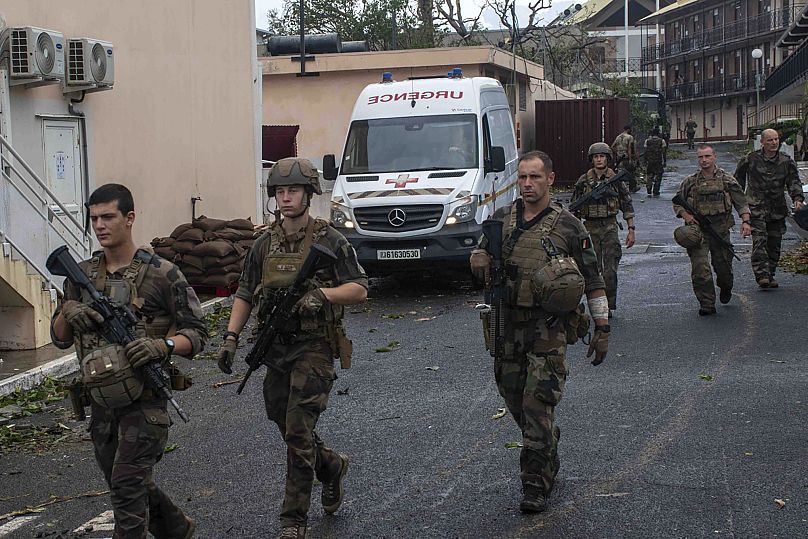'Several hundred' feared dead after cyclone hit French territory of Mayotte

Mayotte Prefect François-Xavier Bieuville told TV station Mayotte la 1ere that “I think there are some several hundred dead, maybe we’ll get close to a thousand.”
He said it was “extremely difficult” to get an exact number right now after the Indian Ocean islands were pummelled by the intense tropical cyclone on Saturday, causing widespread destruction.
Officials had confirmed at least 11 deaths in Mayotte earlier Sunday but said that was expected to increase.
Mayotte in the south-eastern Indian Ocean off the coast of East Africa is France’s poorest island and the poorest territory in the European Union.
Chido brought winds in excess of 220kph, according to the French weather service, ripping roofs off houses in the archipelago which has a population of just over 300,000 and lies around 800km off Mozambique.
In some parts, entire neighbourhoods of metal shacks and huts were flattened, while residents reported many trees had been uprooted, boats flipped or sunk and the electricity supply knocked out.
Chad Youyou, a resident in Hamjago in the north of the island, posted videos on Facebook showing the extensive damage in his village and across the surrounding fields and hills, where almost every tree had been levelled.
“Mayotte is destroyed - we are destroyed,” he said.
Rescuers and firefighters were sent from France and the nearby French territory of Reunion and supplies were also rushed in on military aircraft and ships. Damage to the airport's control tower meant only military aircraft were able to fly in.
Patrice Latron, the prefect of Reunion, said authorities aim to establish an air and sea bridge from Reunion to Mayotte. About 800 more rescuers were to be sent in the coming days and more than 80 tons of supplies had been flown in or were on their way by ship. Some of the priorities were restoring electricity and access to drinking water, Latron said.
The French Interior Ministry said 1,600 police and gendarmerie officers have been deployed to “help the population and prevent potential looting.”
French President Emmanuel Macron said he was closely monitoring the situation, while Pope Francis offered prayers for the victims of the cyclone while on a visit Sunday to the French Mediterranean island of Corsica.
Speaking at an inter-ministerial crisis meeting in Paris, France’s Prime Minister François Bayrou said the short to mid-term consequences of the storm are increasing risk factors.
"The concern is not only for the short term and the relief and assistance that we can provide, but it is also the medium term for the supply of water, food, especially for the most sensitive facilities: prisons, detention centres. And all of this is obviously a risk factor that is accumulating," he said.
"In the coming hours and days, we will surely have to study short-term housing solutions, just as we will also send military gendarmerie reinforcements. And of course we will have to house them, to feed them. But, the essential needs today, beyond relief - relief is now urgent," he told reporters at the emergency meeting in Paris.
In a post on X, France's Minister of the Armed Forces Sébastien Lecornu said the military had been mobilised and that a flight carrying relief supplies was already heading to the islands which lie almost 8,000km from Paris.
French President Emmanuel Macron said he was closely monitoring the situation.
Mozambique also hit
Chido continued its eastern trajectory and into northern Mozambique, while farther inland landlocked Malawi and Zimbabwe warned they might have to evacuate people because of flooding.
In Mozambique, UNICEF said Cabo Delgado province, home to around 2 million people, was the first region to be hit and many homes, schools and health facilities have been partially or completely destroyed.
UNICEF Mozambique spokesman Guy Taylor said that communities faced the prospect of being cut off from schools and health facilities for weeks and Mozambique authorities warned there was a high danger of landslides.
December through to March is cyclone season in the south-eastern Indian Ocean and southern Africa has been pummelled by a series of strong ones in recent years. Cyclone Idai in 201 killed more than 1,300 people in Mozambique, Malawi and Zimbabwe. Cyclone Freddy left more than 1,000 dead across several countries last year.
The cyclones bring the risk of flooding and landslides, but also stagnant pools of water may later spark deadly outbreaks of the waterborne disease cholera as well as dengue fever and malaria.
Studies say the cyclones are getting worse because of climate change. They can leave poor countries in southern Africa, which contribute a tiny amount to global warming, having to deal with large humanitarian crises, underlining their call for more help from rich nations to deal with the impact of climate change.
Mayotte is still under red alert for the general population and people were asked to "remain confined in a solid shelter," prefect Bieuville said.
Only emergency and security services were allowed to go out.
Mayotte is France's poorest department and has previously struggled with drought and lack of investment.
It's also struggled to tackle gang violence and tensions spiked earlier this year due to a water shortage.



